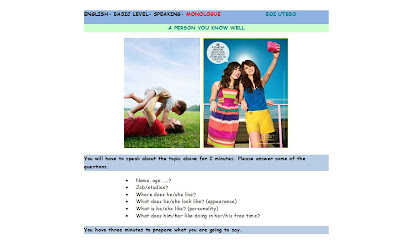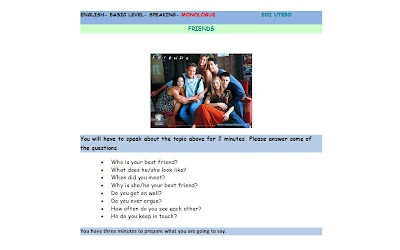Para ver las notas o cualquier otro información podemos acceder a Centros Net.
Thursday, 27 May 2010
Saturday, 22 May 2010
Sample exam June 2007-2008 Aragón

Click here if you can test yourself doing the sample exam of 2007-2008. Be careful when you choose the exam because you will have Basic and Intermediate level. Choose the basic level. The Intermediate is a bit difficult for you.
Monday, 17 May 2010
Friday, 14 May 2010
Sample exam

You will find an English exam of the basic level here. You can practise listening, reading and writing. It is a sample exam of the School of languages of Pamplona.
Thursday, 13 May 2010
Wednesday, 12 May 2010
Monday, 10 May 2010
The Present Simple


They read a lot. He reads a lot.
I/you/we/they read a lot. He/she/(it) reads a lot.
Spelling
-es after -s -ss,- sh,-ch, finish- finishes, -watch-watches
-x fix-fixes and -o do- does, go- goes
Verbs ending in a consonant + y, drop the -y - study -studies, try- tries
Pronunciation
In the present simple the suffix of the third person singular is pronounced
/s/ when the verb ends in a /f/, /k/, /p/ or /t/sound e.g laughs, drinks, sleeps, hates
/iz/ when the verb ends in a /s/, /ʃ/, /tʃ/, /dʒ/ sound e.g. misses, wishes, matches, arranges, rises
/z/ when the verb ends in any other sound e.g. dreams, stays, begins, stands, saves.
Practice: Third person "s" - Pronunciation
http://www.better-english.com/easier/thirdpers.htm
We use the present simple for things that are true in general, or for things that happen sometimes or all the time.
e.g I like big cities. He works very hard. Water boils at 100 degrees centigrade.
With frequency adverbs: never, hardly ever, rarely, sometimes, often, usually, always.
http://www.englisch-hilfen.de/en/exercises/adjectives_adverbs/adverbs_of_frequency.htm
http://www.englisch-hilfen.de/en/exercises/adjectives_adverbs/adverbs_of_frequency1.htm
With adverbial phrases: once/ twice/ three times a week/month/year, very often
in the /morning/afternoon/evening On Sundays/ Tuesdays etc. in summer/winter etc
Exercises with the present tense
http://members.iinet.net.au/~adelegc/grammar/present_simple/pres_simple3.html
http://members.iinet.net.au/~adelegc/grammar/present_simple/pres_simple4.html
Present simple Negative:
I/you/we/they don't watch TV very often. He/ she/it doesn't watch TV very often.
http://www.englisch-hilfen.de/en/exercises/tenses/simple_present_negation_sentences.htm
Present simple questions
do I/you/we/they watch TV? does he/she/it watch TV?
Word order do/does subject infinitive ?
http://members.iinet.net.au/~adelegc/grammar/present_simple/pres_sim_quests1.html
wh- questions
where do your parents live? where does she live?
How often do you go to the cinema? How often does she go to the cinema?
http://members.iinet.net.au/~adelegc/grammar/present_simple/pres_sim_quests2.html
Sunday, 9 May 2010
Monday, 3 May 2010
Used to + a verb I used to/ did you use to?/ I didn't use to
Match the two halves of the sentence by typing the letter in the box.
Subscribe to:
Comments (Atom)














